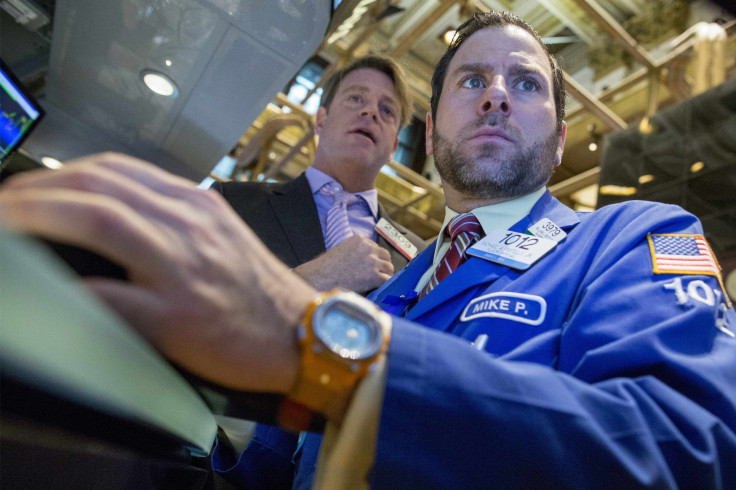Wall Street's Week Ahead: Dow Jones Industrial Average Drops As Greek Exit Fears Escalate

U.S. stocks turned lower Monday morning after Greek Prime Minister Alexis Tsipras rejected an extension to the country’s $270 billion bailout program, reigniting concerns of a possible Greek exit from the eurozone. Following his comments, shares on the Athens Stock Exchange plunged nearly 5 percent Monday, weighing on the global financial markets.
On Monday morning, the Dow Jones Industrial Average, which measures the share prices of 30 large industrial companies, fell 71.83 points, or 0.40 percent, to 17,752.46; the S&P 500 stock index lost 5.79 points, or 0.28 percent, at 2,050.08. The Nasdaq Composite fell 14.66 points, or 0.31 percent, to 4,729.74.
Greece Rejects Bailout Extension, Won't Cooperate With Troika
During his inaugural speech in parliament Sunday, Tsipras said Greece would not extend the deadline for its bailout, putting the economy in danger of going bankrupt. The new leftist premier also said he would reverse some of the measures imposed by Greece's creditors, risking the country's place in the eurozone.
The move comes after the new Greek government said last month it would not cooperate with the so-called troika -- the European Commission, European Central Bank and International Monetary Fund -- and will not seek an extension to the bailout program that ends Feb. 28. Before winning national elections last month, the far-left Syriza party, led by Tsipras, staged a revolt against the budget cuts and other austerity measures under the bailout arranged by the troika and accepted by Greece's previous conservative government.
Tsipras’ comments come after Standard & Poor’s downgraded Greece’s credit rating Friday with a negative outlook. The European Central Bank also announced Wednesday it is blocking banks from using Greek debt as collateral, increasing investors’ concerns about the global economy.
Retail Sales to Reveal Economic Health of the U.S. Consumer
Looking ahead to this week's economic calendar, economists will get a glimpse into the mindset of the U.S. consumer following the holiday shopping season as retail sales for January are released on Thursday. Retail sales are a key indicator of the overall health of the U.S. economy as consumer spending accounts for nearly two-thirds of gross domestic product.
Retail sales fell short of expectations in December during the Christmas shopping season after U.S. consumers picked up spending in November, boosted by a drop in gasoline prices. Economists expect to find that retail sales in January fell 0.5 percent, following a decline of 0.9 percent in December, according to analysts polled by Thomson Reuters.
Gas Prices Rise for First Time Since June
U.S. gas prices rose for the first time since June, jumping 13 cents in the past two weeks to $2.20 a gallon, according to a survey released Sunday by independent market research company Lundberg Survey Inc. The drop in gasoline prices have been primarily driven by the nearly 50 percent decline in global oil prices since June. Gas prices are still down $1.10 a gallon from the same period a year ago.
Global oil prices ticked up in morning trading Monday after posting their biggest two-week gain since 1998 on Friday. Brent crude, the global benchmark for oil prices, rose above $58 a barrel on Monday after the Organization of Petroleum Exporting Countries said demand forecast for its oil would be more than expected in 2015.
Brent crude rose 1.16 percent Monday to $58.47 a barrel, for March 15 delivery, on the London ICE Futures Exchange. Meanwhile, West Texas Intermediate crude, the benchmark for U.S. oil prices, added 2.40 percent Monday to $52.93 a barrel, for March 15 delivery, on the New York Mercantile Exchange.
Economists Eye China Inflation, Europe GDP Data
Economists will be eyeing data out of China Tuesday after Beijing reported Sunday that exports dropped 3.3 percent last month from a year earlier, while imports tumbled 19.9 percent, widely missing analysts’ expectations. On Tuesday, China will release key inflation data, including its Consumer Price Index, which measures the prices of consumer goods and services, along with its Producer Price Index, which gauges the average change in selling prices that are measured at the wholesale level. On Friday, the European Union will release its initial gross domestic product figures for the fourth quarter, as will Germany, the largest economy in Europe.
Here's the latest economic calendar for the week of Feb. 9. All listed times are EST.
Monday, Feb. 9
- 10 a.m. -- Labor Market Conditions Index (January)
Non-U.S.:
- Australia -- Reserve Bank of Australia Governor Glenn Stevens Speech
Tuesday, Feb. 10
- 9 a.m. -- NFIB Small Business Index (January)
- 10 a.m. -- Job Openings (December)
- 10 a.m. -- Wholesale Inventories (December)
Non-U.S.:
- China -- Consumer Price Index (January)
- China -- Producer Price Index (January)
Wednesday, Feb. 11
- 2 p.m. -- Federal Budget (January)
Non-U.S.:
- China -- New Loans Released by People's Bank of China
- U.K. -- Bank of England Quarterly Inflation Report
Thursday, Feb. 12
- 8:30 a.m. -- Weekly Jobless Claims (Week ended February 5)
- 8:30 a.m. -- Retail Sales (January)
- 10 a.m. -- Business Inventories (December)
Non-U.S.:
- U.K. -- Bank of England Governor Mark Carney Speech
- Australia -- Reserve Bank of Australia Governor Glenn Stevens Speech
- Australia -- Unemployment Rate (January)
Friday, Feb. 13
- 8:30 a.m. -- Import Price Index (January)
- 9:55 a.m. -- Consumer Sentiment (February)
Non-U.S.:
- Europe -- Gross Domestic Product (Q4)
- Germany -- Gross Domestic Product (Q4)
© Copyright IBTimes 2025. All rights reserved.






















